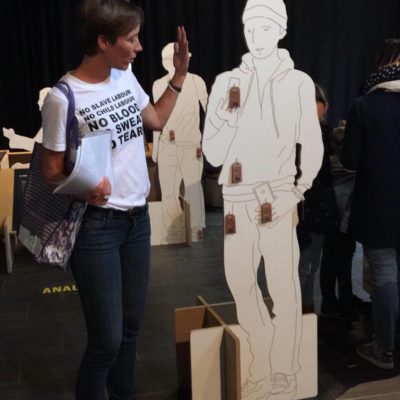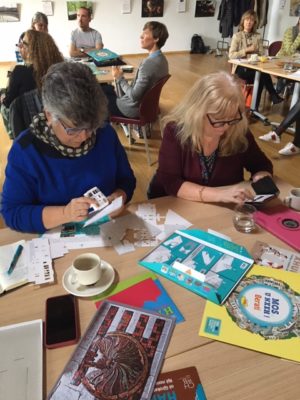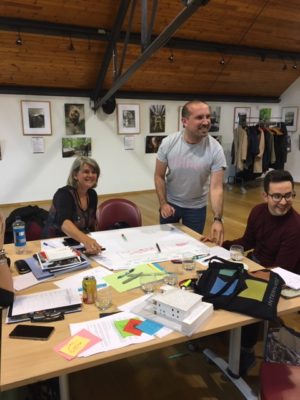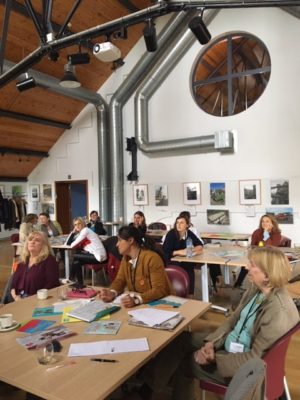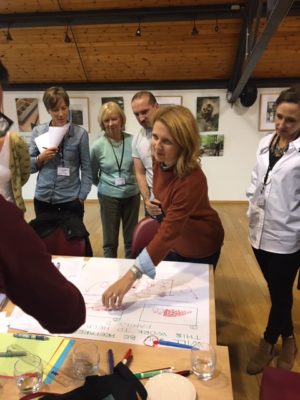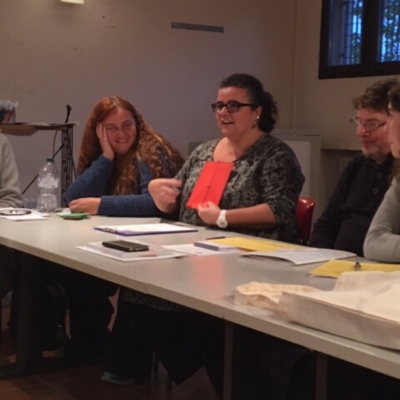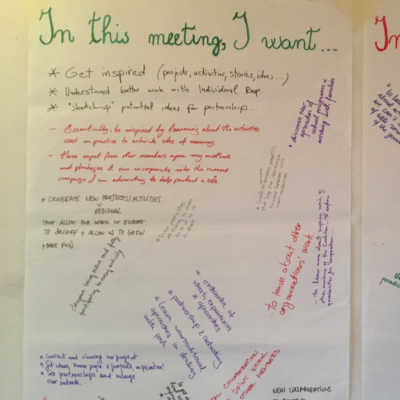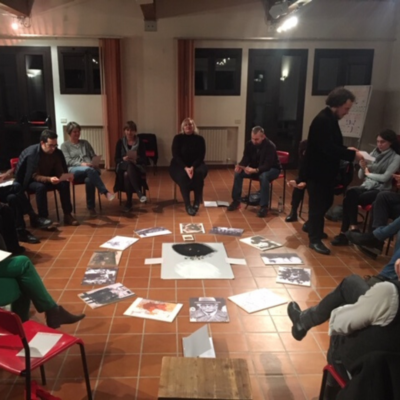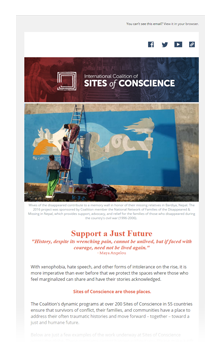About us
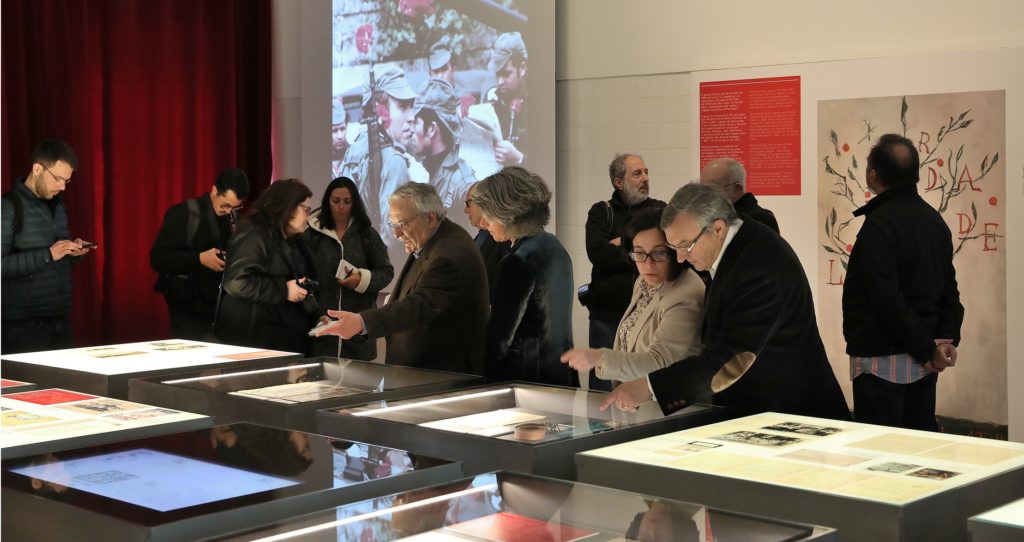
In 2015, the International Coalition of Sites of Conscience – Europe (ICSC-Europe) was established as an independent legal entity following more than eight years operating as one of seven regional networks of the International Coalition of Sites of Conscience (ICSC). Registered as a non-profit organization in Belgium, ICSC-Europe was founded to solidify a unified and sustainable platform for action for the European Sites of Conscience Network.
Mission
Transform, expand and activate the role of historic museums and sites of remembrance as agents of social change. The Organization carries out its mission through European cooperation and the implementation of cultural and civic engagement activities.
Who We Are
ICSC-Europe represents a network of 46 museums, historic sites and memory organizations in 21 countries. Ranging from Our Lord in the Attic Museum in Amsterdam, to the Memorium Nuremberg Trials in Germany, and the War Childhood Museum in Bosnia, ICSC-Europe works with its members to use the lens of memory – of historic waves of immigration, decades of repression, and of ethnic and religious conflicts – to inform and fortify civic action that challenges intolerance and violence in Europe. To see a list of members, click here.
ICSC-Europe carries out its mission under the belief that as trusted educational and community spaces containing human and visceral connections to the past, museums and historic sites are exceptionally suited for fostering dialogue, catalyzing civic engagement and bringing about social change.
ICSC-Europe employs dialogue as a methodology and interpretive strategy to enable the public to make the connection between past and present, and memory to action. It applies this framework to enduring social issues addressed by historic sites and museums to foster an exchange of ideas.
Aiming to move visitors beyond passive learning, Sites of Conscience use facilitated dialogue in exhibits, tours, and a variety of creative and artistic programs – whether it is theater, visual arts, music, exhibit design or dance – to connect with audiences in relevant and personal ways. The most effective programs are those that “flip the official narrative” in creative and interactive ways to ensure that all stories are heard.
Drawing from the fields of art, public history, heritage, human rights and education, Sites of Conscience bring together different groups and communities as centers for artistic experimentation, collaboration and community-building.
Most Recent Activities
Lilliput plus
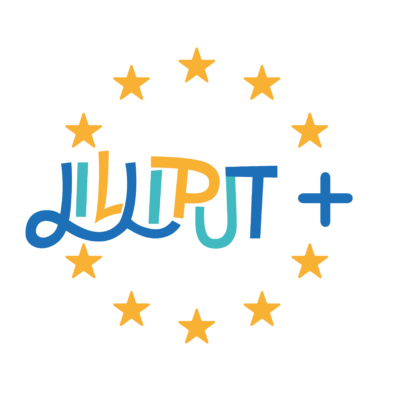 The LILLIPUT PLUS project is an initiative of the multidisciplinary Lilliput Network and the International Coalition of Sites of Conscience – Europe (the Coalition) to pilot and systematize a new methodology for European historic museums and cultural centers to more effectively engage families in their programming. To learn more about this project, click here.
The LILLIPUT PLUS project is an initiative of the multidisciplinary Lilliput Network and the International Coalition of Sites of Conscience – Europe (the Coalition) to pilot and systematize a new methodology for European historic museums and cultural centers to more effectively engage families in their programming. To learn more about this project, click here.
“European Sites of Conscience: Helping Foster a New Generation of World Citizens”
Le Boiz du Cazier, Belgium, October 2019.
In October 2019, in honor of the 50th anniversary of the Declaration of the Rights of the Child, ICSC- Europe organized “European Sites of Conscience: Helping Foster a New Generation of World Citizens”, a three day meeting on the role of museums and historic sites in promoting/ensuring children’s rights. Meeting participants were asked to present creative and innovative projects engaging minors at museums and historic sites throughout Europe. These included: “Forbidden to play” a temporary exhibit on Child Labour; “Talent Lab” a multifaceted educational project by artist Eran Shakine inspired by his exhibit “A Muslim, A Christian and a Jew”; and “Free Zone Junior Project” a film/documentary making project for high school students in Serbia. In addition, participants partook in experimental workshops on designing children’s games based on the E KA KUSH E KA children series (CHwB-Albania) or developing interactive educational activities (for children Ages 9-12). The meeting was housed at Le Bois du Cazier, Belgium, a World Heritage Site, and the site of a former coal mine.
“Can I make a difference?
Grappling with Individual Responsibility at Sites of Conscience”
Fondazione Scuola Di Pace di Monte Sole, Italy, November 2018
As citizens and as Sites of Conscience, we are continually confronted with the notion of doing vs. not doing, taking action vs. failing to prevent. As we witness and experience the current socio-political events and manifestations of hatred, national extremism and xenophobia in Europe and around the globe, one cannot help but question: what’s my duty? From November 13-16, 2018, ICSC-Europe organized “Can I make a difference? Grappling with Individual Responsibility” a meeting around the work of author Primo Levi. The meeting was hosted at the Monte Sole Peace School, in the mountains outside Bologna, where between September 29 and October 5, 1944, 800 civilians were killed by the Nazi SS troops with the help of Italian fascist elements. The site and work of the Monte Sole Peace School served as the basis for participants to reflect on the concept of Individual Responsibility from Primo Levi’s book “I sommersi e i salvati – The drowned and the saved.” The meeting agenda included a wide variety of activities specifically designed for the group to tackle the meeting theme. Among them: The Gray Zone, a workshop by Archivo Zeta, an Italian cultural association. Using theater as a medium of communication and expression, Archivo Zeta and the Monte Sole Peace School work together on citizenship education.Their cooperation has led to a cultural format working in the intersection of memory, education, theater, and action (M.E.T.A).
Please find the meeting report here.
Contact Information
Justine DiMayo


